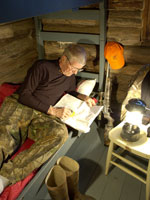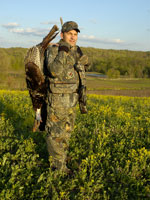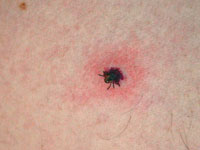How to Survive Turkey Season
Dealing with Social Problems, Water and Vitamins and Lyme Disease
 Editor’s Note: Behold the turkey hunter. Up before first light, coffee in hand and dressed in full camo, he approaches the new day ready to attempt to outsmart one of God's noblest creations. At Editor’s Note: Behold the turkey hunter. Up before first light, coffee in hand and dressed in full camo, he approaches the new day ready to attempt to outsmart one of God's noblest creations. At  least, that's how we like to think. But the rest of the world sees the turkey hunter as short-tempered, slow walking, and grumpy with a runny nose and a sore throat who constantly complains about what he has to endure to hunt gobblers and how he's so tired. Most of us have learned we may take gobblers, but the birds will beat us up in the process. We went to the medical community to learn how to survive turkey season. Dr. Robert Sheppard of Carrollton, Alabama – an avid turkey hunter and cardiologist – has researched why gobbler-chasers feel so beaten up during turkey season. least, that's how we like to think. But the rest of the world sees the turkey hunter as short-tempered, slow walking, and grumpy with a runny nose and a sore throat who constantly complains about what he has to endure to hunt gobblers and how he's so tired. Most of us have learned we may take gobblers, but the birds will beat us up in the process. We went to the medical community to learn how to survive turkey season. Dr. Robert Sheppard of Carrollton, Alabama – an avid turkey hunter and cardiologist – has researched why gobbler-chasers feel so beaten up during turkey season.
Why Turkey Hunters Have Social Problems:
"Too much turkey hunting can result in the hunter's inability to perform his job effectively, since he'll often be short-tempered and tend to be forgetful," Sheppard points out. "He also may become short with his family. These are normal responses to sleep deprivation." Because turkey hunting requires a serious commitment of time and energy, Sheppard recommends that hunters try to become more organized. He offers two solutions to solve many of these turkey-hunting problems:
* plan to sleep after you return from turkey hunting; and/or 
* go to bed earlier at night during turkey season to maintain a minimum of sleep.
However, remember catnaps in the woods and sleeping for 30 or 45 minutes when you return can't make up for the 6 hours of solid, uninterrupted sleep you need to maintain peak performance.
What about More Water and More Vitamins?
"Vitamin deficiencies are fairly rare in American culture," Sheppard c omments. "Taking more vitamins won't help you cope with problems related to sleep deprivation. Vitamins won't hurt you, but they just won't make up for lost sleep." Many hunters believe that drinking more water helps reduce the stress of turkey hunting. But Sheppard explains that because of the cooler weather during turkey season, a lack of water rarely affects the body. omments. "Taking more vitamins won't help you cope with problems related to sleep deprivation. Vitamins won't hurt you, but they just won't make up for lost sleep." Many hunters believe that drinking more water helps reduce the stress of turkey hunting. But Sheppard explains that because of the cooler weather during turkey season, a lack of water rarely affects the body.
What Diseases May Await You In Turkey Woods:
The woods expose your body to a host of diseases that you rarely will encounter in suburbia. "Hunting often exposes hunters to Lyme disease, which ticks carry," Sheppard warns. "Because fatigue is a symptom of Lyme disease, you may not realize you're infected until after turkey season. Mosquitoes also carry many diseases – most commonly St. Louis encephalitis, a potentially lethal infection of brain tissue."
Tomorrow: No Alcohol, More Sleep, Regular Eye Checks and Body Conditioning
|
